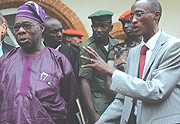JOMBA - General Laurent Nkunda has said he objects to the inclusion of the United Nations’ peace keeping forces-MONUC in the negotiation talks to stop the war in DR Congo.


JOMBA - General Laurent Nkunda has said he objects to the inclusion of the United Nations’ peace keeping forces-MONUC in the negotiation talks to stop the war in DR Congo.
The talks between the National Congress for the Defence of the people (CNDP) and the DR Congo government will be mediated by Olusegun Obasanjo, the UN General Secretary’s special envoy in Eastern Congo.
Nkunda was Sunday evening speaking to journalists in Jomba Catholic mission, (part of the Eastern Congo territory under the control of the CNDP). This was after the first meeting between his CNDP and Obasanjo.
The CNDP leader said that he does not trust MONUC to be objective if they participated in the talks because they are fighting alongside DR Congo forces.
The talks began on the weekend with Obasanjo earlier meeting Joseph Kabila and his Angolan counterpart Dos Santos before flying to meet Nkunda in Jomba 60 km from Goma.
"We are supporting Obasanjo because he has been sent by the international community. We believe in him. Obasanjo has experience as a former president of Nigeria. We welcome Obasanjo because he our chance for peace. But we do not have faith in MONUC. They have sided with government forces to shoot at us. We cannot negotiate with them,” Nkunda said.
Obasanjo was last week appointed the United Nations’ Special Representative to the DR Congo after the recent outbreak of war between the CNDP and the DR Congo government forces last month.
Recent battles have seen the CNDP gain more territory and increased fortresses in Eastern Congo capturing large swathes of land from which settlers had been displaced by the Democratic Forces for the Liberation of Rwanda (FDLR).
The FDLR are reported to have joined DR Congo government forces.
The CNDP declared a ceasefire but reports say that government and FDLR forces continue to attack his forces and areas where Congolese ethnic Tutsi are believed to be leaving in large numbers.
The ceasefire has allowed for diplomatic efforts to increase in finding a peaceful solution to what looks like an eternal crisis in Eastern Congo.
Last weekend, DR Congo Foreign Affairs Minister, Alexis Tambwe Muamba, was in Kigali and stated that his government was now going to flush out the FDLR from its territory. He also pledged to restore diplomatic relations with Rwanda after a decade of cold silence between the two neighbours.
After the meeting with Obasanjo, Nkunda said that the CNDP forces have not put any condition to being integrated into the DR Congo government forces and that he was not rebelling against Kabila’s government in order to get a government post.
"My demand is to have solutions to the problems in my country, not getting government jobs,” he said.
Nkunda further stated that he welcomed any means to achieve peace in Eastern Congo, "We do not want to continue fighting because wars are very expensive in terms of men and materials. We are forced to go to war. Today we have a chance to stop the war by talking peace. We hope Kabila is serious with his promises to Obasanjo.”
Several of Nkunda’s senior aides, however, expressed scepticism about Kabila’s commitment to peace efforts in the region.
"We have been here before but Kabila fakes the international community and sends his forces along with the FDLR to attack our people destroy and rape our women. We shall wait and see what Obasanjo promises. Kabila told him (Obasanjo) that he would talk to us. We wait,” one of the aides said.
However, the CNDP forces, reiterated their commitment to maintaining the ceasefire they declared several days back before they halted their advance towards Goma.
There were reports that fighting broke out between government forces along with FDLR forces against the CNDP near Kanyabayonga, an important communication town after Goma.
In this town, government forces on their retreat reportedly looted and raped scores after the CNDP had advanced within several kilometres.
MONUC and government troops are reported to be fighting on the same side.
Obasanjo described the talks with Nkunda as ‘extremely good’ and added that he now knows Nkunda’s concerns.
"I can put across Nkunda’s demands,” Obasanjo said, adding that the renegade soldier has legitimate demands.
"His concern, which everybody wants, is the welfare of the Congolese people, especially the minority in the population. But achieving peace is like dancing Tango, there needs to be a partner. Both parties need equal participation in this process,” the former Nigerian President stated.
Dr. Liberata Mulamula, the Executive Director of the International Conference on the Great Lakes Region, attended the Nkunda-Obasanjo talks.
Eastern DR Congo continues to live under a state of insecurity after the end of the 1994 Genocide of Tutsis in Rwanda. The masterminds of the Rwanda Genocide fled to this largely isolated region where government control is weak.
The genocidaires have since joined up with the DRC government forces and multiplied in numbers and added to the complex socio-political situation in this agriculturally rich land.
The genocidaire forces, have embarked on a sustained campaign to attack Congolese ethnic Tutsi tribesmen. This state of affairs has led to the evolvement of the FDLR and the Interahamwe to form a myriad bandit groups that have ensured insecurity for the Tutsi in the region.
Ends


